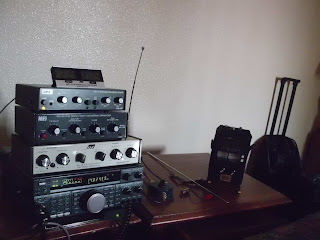The previous BLOG entry in this series gave me a chance to genuflect on the last 10+ years of radiosport activities. In Part 2 of this series I want to share some further details from what was written up in Part 1.
Some radio amateurs spend their operating time engaged in emergency preparedness while deriding the time spent by other amateurs who spend time engaging in radiosport competitions. Evidently it does not occur to them that radiosport operators are often more effective at getting the message through than anyone else; we "rehearse" doing so, nearly every weekend.
Because I often ran radiosport events from portable locations such as hotel rooms, these activities gave me a considerable amount experience in quick-setup an easy takedown of radio equipment and makeshift antenna configurations.
One of the more frustrating portable antenna designs was the 2010 WQ6X Classic Hamstick dipole. Against a flat wall it had limited azimuth coverage but produced an amazingly low-angle signal.
Also in 2010 WQ6X ran a loaded Kenwood TS-450s from a number of hotel locations into the Hamstick dipole and an MFJ "Apartment" antenna.
While the TS-450s tuner can match/load nearly any antenna (it once produced a mobile QSO w/JA on 17-m Cw using a 2-m magmount) without an elaborate counterpoise system there was always nasty RF floating around the room.
Altho wonderful, cascading MFJ-7523C and JPS NIR-12 audio filters make operations more effective.
While the NIR-12 now runs in the RX-B audio line on my current Yaesu FT-1000mp, the MFJ-752's have been relegated to the "research lab", replaced by a pair of more capable Autek QF-1 filters. Having a built-in audio-based DSP built-in to the transceiver (RX-A) and the external NIR-12 audio DSP (RX-B) gives the radio contest power of DSP-based transceivers costing $3K, and, with greater flexibility.
As equipment and antennas have improved considerably since 2011, each step of the way has taught me new approaches towards improving operating efficiency. Should a "disaster" strike, having operators like WQ6X in your EOC (Emergency Operations Center) will help get the message
through - every time - because that's what we do.
How do YOU leverage your radiosport operating skills?





No comments:
Post a Comment